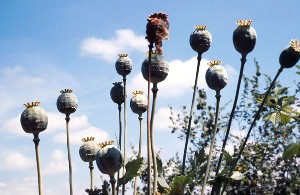Newsbrief:
End
of
Opium
Cultivation
Spells
Looming
Disaster
for
Burmese
Peasants
10/22/04
Citing United Nations officials, ethnic Wa leaders, and unnamed foreign assistance workers, the Bangkok Post reported last week that the coming end to opium cultivation in Burma will bring poverty and hunger to hundreds of thousands of Wa and other peasants traditionally dependent on the poppy for economic survival. According to the UN Office on Drugs and Crime (UNODC), opium production is already down dramatically in Burma and as a consequence peasants are already suffering.
Still, Wa leaders have committed to eradicating opium production in their areas, with top Wa leader Bau Yuxiang vowing to cut off his own head if the Wa fail to keep their promise. "Opium has been with us for more than 100 years and it has been disastrous for our health and development," the Wa chairman told the Post. "If people plant opium and they smoke it, they don't want to do anything else. If they stay like this, there is no hope and no future for our people. We are very determined to stamp out poppy cultivation in our areas," Bau Yuxiang said. Some 350,000 Wa and Kokang peasants have already stopping growing poppies, the UNODC head told journalists in Rangoon earlier this year. "This will increase to more than two million people next year," he said. According to aid experts who spoke to the Post only on condition of anonymity, hundreds of Kokang and Wa peasants have died for lack of food and medicine since they quit growing poppies, the leading cash crop in northern Burma. While neither Burmese nor UN officials would confirm such stories, the Post also reported that a village in Shan was wiped out by malaria for lack of money to buy medicines, with some 300 to 400 people killed. With more peasants expected to quit growing poppies, Wa and Burmese officials are worried. "It will take three to five years for the farmers to recover from the crisis that will follow the end of poppy cultivation," the Wa's second in command, Shao Min Liang, admitted to the Post earlier this year. For many of the peasants, not growing poppies means leaving their homelands, said UNODC head Lemahieu. "The lessons of the Kokang region after the opium ban in 2003 are a warning signal for what is going to happen in the Wa areas," he said. "The population fell by 60,000 [from 200,000 to 140,000], with the most people heading inland in search of a better living. Two out of three private Chinese clinics and pharmacies closed their doors and one in three community schools ceased operating. About 6,000 children were forced to leave school, effectively halving the enrolment rate compared to the previous year," Mr Lemahieu recounted. "We don't know what we are going to do," said former poppy grower Ti Kwan Sum. "We just hope for the best." But according to the UNODC, crop substitution and alternative development programs will not replace the income generated by the lost poppy crops. Other than emigration, peasants may find income opportunities in working in casinos, the sex trade, or other illegal occupations, and with ethnic Chinese criminal gangs waiting in the wings, the region could become insecure and unstable. Or the peasants could go back to growing opium, the Post suggested.
|

